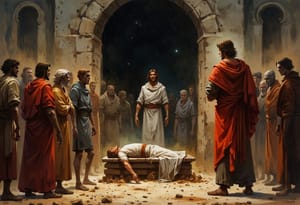| Series | Living with the Romans |
|---|---|
| Theme | 1. At the time of Jesus - I taimi o Iesu |
| Colour | Lanu Auro |
Scripture Focus: Ioane 11:45-53
Therefore many of the Jews, who came to Mary and saw what Jesus did, believed in him. But some of them went away to the Pharisees, and told them the things which Jesus had done. The chief priests therefore and the Pharisees gathered a council, and said, “What are we doing? For this man does many signs. If we leave him alone like this, everyone will believe in him, and the Romans will come and take away both our place and our nation.” But a certain one of them, Caiaphas, being high priest that year, said to them, “You know nothing at all, nor do you consider that it is advantageous for us that one man should die for the people, and that the whole nation not perish.” Now he didn’t say this of himself, but being high priest that year, he prophesied that Jesus would die for the nation, and not for the nation only, but that he might also gather together into one the children of God who are scattered abroad. So from that day forward they took counsel that they might put him to death.
- John 11:45-53 (WEB)
Study:
This passage reveals a striking contrast in reactions to Jesus. Many believed after witnessing Lazarus’ resurrection, but others ran to the Pharisees, fearing the implications of Jesus’ growing influence. The religious leaders were motivated not by spiritual concern, but by political fear – the potential loss of their power and standing with the Roman authorities. Caiaphas, in a chillingly pragmatic (and unknowingly prophetic) statement, suggests Jesus' death is politically advantageous to maintain control. He prioritizes the preservation of the nation, as *he* understands it, over truth and righteousness. The irony is profound: his attempt to avert Roman intervention actually sets in motion the very events that will ultimately lead to the fulfillment of God's plan, and the wider gathering of God's children. The decision to kill Jesus wasn’t born of faith, but of fear and control.
Application:
We often face similar choices today. Do we prioritize truth and faithfulness, even when it's unpopular or challenging? Or do we compromise our convictions to maintain comfort, avoid conflict, or protect our own positions? The Pharisees’ fear of losing status echoes in our own lives when we prioritize reputation or security over doing what's right. We can be tempted to silence truth to keep the peace or avoid upsetting those in power. This passage reminds us to courageously stand for truth, even when it’s difficult, trusting that God's plan will prevail.
Reflection Questions:
- How does the fear of societal or political consequences influence my decisions?
- Are there areas in my life where I’m compromising my values to maintain comfort or acceptance?
- How can I more faithfully live out my beliefs, even in the face of opposition?
- What does it mean for me that Caiaphas unknowingly prophesied through his desire to control the situation?
Prayer:
Lord, give me the courage to stand for truth, even when it’s difficult. Help me to overcome my fears and prioritize your will above the opinions of others. May I be a vessel for your truth, and trust in your plan, even when I don't understand it. In Jesus’ name, Amen.
Tags: John 11, Lazarus, Pharisees, Romans, Fear, Truth, Courage, Political Influence, Caiaphas, Jesus, Belief, Faith, Discipleship
